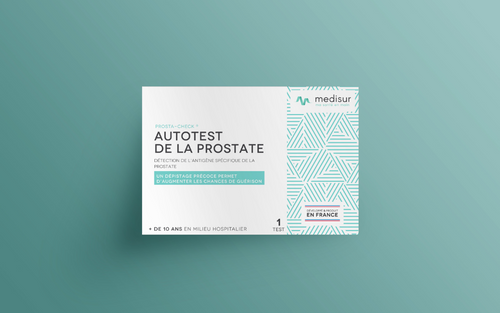Prostate cancer is the leading cancer in men in France.
Definition, symptoms, diagnosis…
We count 50 400 new cases of prostate cancer detected in 2015 in metropolitan France.
It is closely followed by lung cancer and colorectal cancer. In addition, prostate cancer is the third leading cause of death in men with about 8 000 death each year in France. It is said that1 in 9 men will develop prostate cancer in their lifetime.
Please note: prostate cancer is common but has a good prognosis with a 5-year survival rate of more than 90%.
There are now reliable screening methods that can facilitate care and thus increase the chances of survival.
What is the prostate?
The prostate is a gland present in the male reproductive system. Its function is to produce a liquid that makes up sperm. Prostate cancer develops from the initially normal cells of the prostate gland. The affected cells transform and multiply in an anarchic way, until they form a mass: a malignant tumour.
The noticeable symptoms of this cancer:
- Frequent urge to urinate, especially at night
- Urinary infections such as cystitis, prostatitis and pyelonephritis
- Urinary leaks
- Weak urine stream
- Presence of blood in semen or urine
- Difficulty getting an erection
- Pain during ejaculation
LouseHowever, it is important to remember that, most often, prostate cancer develops without causing any symptoms.
The different risk factors
Prostate cancer has several risk factors related to its appearance:
- age : this cancer generally concerns men over the age of 65. Indeed, the median age at diagnosis is 68 years. Therefore, prostate cancer remains exceptional in younger men.
- heredity : it is important to take an interest in one's family tree to determine the hereditary risks linked to the development of prostate cancer. Men who have a close father, grandfather, brother or uncle who has already been affected by prostate cancer are at greater risk of developing the disease. Nevertheless, according to theCurie Institute, 80% prostate cancers are not caused by a family history.
- Ethnic origin : according to Arch Foundation, ethnic origin has been identified as a risk factor in the development of prostate cancer. The incidence is high in the French West Indies as well as the French from Africa.
- food : a diet high in fat (especially red meat) and with an insufficient intake of fruits and vegetables may increase the risk of developing prostate cancer in men. Instead, favor fish and vegetables, typical of the Mediterranean diet!
- The environment : there is indeed a risk factor linked to the environment and even closely linked to the professional field but especially to agriculture and the daily use of pesticides.


Prevention and screening methods
Do you know Movember ?
It is the international movement that promotes the prevention of male diseases. Movember takes place every year in November and represents the month of prevention assimilated to the fight against cancer of the prostate and testicles. Nevertheless, Movember is also an opportunity to raise awareness about men's health as a whole. This also includes mental health!
Getting closer to such a movement is a good way to take a first step in health prevention and to find out about possible screening methods.
An objective according to the Movember foundation: “By 2030, we will reduce the number of men who die prematurely by 25%.”
Movember in your company?
So, in November (and all year round), wear a mustache and think prevention!
Examination by a urologist
The most common way to screen for prostate cancer is to make an appointment with a urologist. The health professional can proceed with two possible examinations:
- rectal examination
- The PSA (prostate specific antigen) assay via a blood test
Self-testing for all
Beyond sharing information, it is good to take action!
An alternative to screening by a doctor is the use of a self-health test. Easy to use, accessible and reliable, the Medisur prostate self-test makes it possible to detect cancer or an abnormality of the prostate thanks to an autonomous and intimate practice. This tool is available in pharmacies without a prescription. The self-test is not the result of a medical diagnosis: if a positive result appears, it is necessary to consult a doctor without delay!


